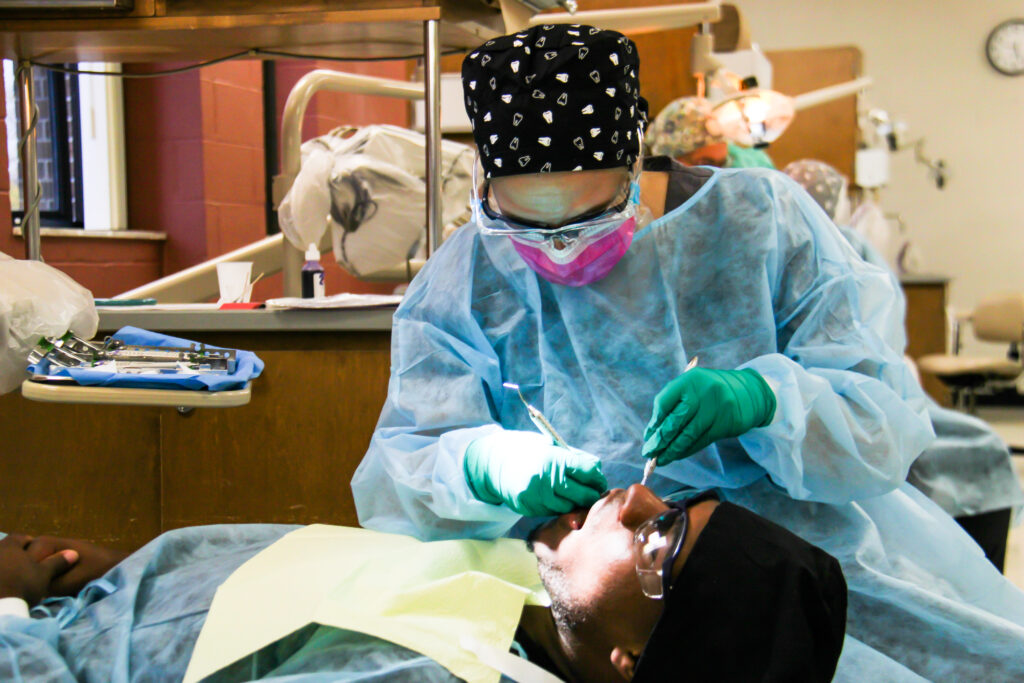
Dental hygiene students are having a hard time getting their patients to open wide due to the pandemic.
Compared to other professions, employees in most medical settings have had to deal with much stricter rules during the pandemic. The students who work in Ferris’ dental hygiene clinic are no exception.
The students working at the clinic only know what it is like to meet with patients in a situation that requires extra care due to the pandemic. That can be a challenging thing to overcome.
Andrea Grunow and Taelyn Siddall have been working in the dental clinic for over a semester now, and they say that the university does a lot to make sure the clinic is safe. Both the student and patient are screened for COVID-19 before entering the clinic, and that is just the beginning.
“We have a separate room set up with aerosol vacuums where we use aerosol producing instruments, such as polishers and ultrasonic cleaners. We also wear an N95 mask under a surgical mask in this room,” Grunow said.
Then there is all the personal protection equipment, or PPE, that students need to wear, along with sanitizing any surfaces used.
“Each student wears a gown over their scrubs, a skull cap, and a face shield over safety glasses and a surgical mask,” Grunow said. “As a whole, the program is very adamant about sanitizing the surfaces we use and any surfaces that could potentially be contaminated both before and after patient treatment.”
All of the precautions taken make those in the clinic feel safe while they’re working in the middle of the pandemic.
“As of right now, I don’t get nervous because of all the PPE we have to wear and the limited aerosols in the clinic,” Siddall said.
“Personally, I do not get nervous working with the public. Mainly because we take so many precautions to make the student and patient feel safe during the appointment, and I think many of my other classmates feel the same way,” Grunow said.
The students also think that the precautions are also helping the patients who come into the clinic feel less nervous as well.
“People don’t seem nervous to come into the clinic because they know we take so many precautions, and if they are nervous, they probably don’t come in anymore at all,” Siddall said.
“I have not had too many patients come into the clinic that express verbally that they are concerned about Covid. This semester it seems many of our patients are part of the older population demographic, and are beginning to go out into the public more,” Grunow said. “It is common for us to see older patients who are getting ready to travel to Florida for the winter and are looking for a dental cleaning. If anything, they are eager to take their mask off for [the] cleaning they are overdue for because of Covid-19.”
While the extra precautions do a lot in making those in the dental clinic feel safe, it also presents challenges when interacting with patients.
“Since my class of dental hygiene students joined the program during the height of Covid-19, the only thing we know is how to interact and treat patients using all of these precautions,” Grunow said. “I think it would have been easier to interact one-on-one with my patient before Covid because we wouldn’t necessarily be wearing multiple layers of protection that can make hearing and understanding one another challenging.”
“It is definitely weird learning how to be a dental hygienist in the middle of the pandemic and interacting with my patients,” Siddall said. “There’s definitely a barrier with the masks when it comes to my patients being able to hear me.”
For now, work in the dental clinic will carry on with these precautions for the foreseeable future. It is impossible to know when the next class will go through the program without dealing with all of the extra precautions.
Appointments can be made at the dental hygiene clinic by calling (231) 591-2260.
